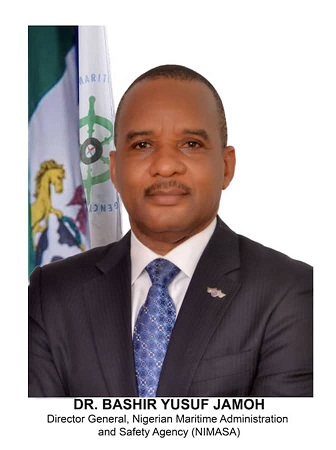The Director General of the Nigerian Maritime Administration and Safety Agency (NIMASA), Dr. Bashir Jamoh, has appealed to international maritime communities to consider an end to charging Nigerian shippers war risk insurance premium.
Jamoh made the appeal weekend at a news briefing where he talked about the progress Nigeria has made in efforts to improve security in the Gulf of Guinea (GoG), where several piracy attacks had taken place.
The NIMASA DG said that indeed Nigeria’s commitment to ensuring security of the GoG was duly established with the inauguration of the maritime security architecture otherwise known as the Deep Blue Project, on 10th of June.
He said that with the full deployment of the Deep Blue Project assets, the expectation was that there would an end to such surcharge, which Nigeria had yet seen.
“We started the campaign for the international community to rethink the war risk surcharge on Nigeria-bound vessels. The day Mr. President came to commission the assets, we draw the attention of the international maritime communities that they should reconsider their positions and not to continue charging Nigerian war risk insurance premium.
“Interestingly, today morning I read a submission made by one of the officials of Lloyd’s that even though we recognise the commitment of Nigeria, we appreciate the progress made so far, but we will continue to charge War Insurance Premium because we have to see more commitment by the Nigeria Government before we do that.
“The implication of this statement shows that the international maritime communities are listening to what we are saying and they are now responding and we will continue to respond too,” Jamoh said.
He noted that Nigeria as one of several countries within the GoG should not actually take the entire blame for insecurity of the area; however, the country had not rested on its oars.
Jamoh added that: “They say they want to see more commitment. Are we benchmarked? If we are benchmarked, they say they appreciated our commitment, the progress made so far, then they should go back to the benchmark and see what items can be ticked off, and reduce the premium so that Nigerians would not continue to suffer to pay something that they are not responsible for.”
He said that sadly, all Nigerians who purchase any imported item are the ones paying for the extra cost imposed by the shipping lines, an action he said definitely impacted on the nation’s economy.
According to Jamoh, the Integrated National Security and Waterways Protection Infrastructure (Deep Blue Project) assets deployed covers land, air and sea.
“The land assets comprise the Command, Control, Communication, Computer, and Intelligence Centre (C4i) for intelligence gathering and data collection.
“All other assets are connected to the C4i, and it has staff from all components of the security apparatus – the Nigerian Army, Nigerian Navy, Nigeria Airforce, the Police and others are the Civil Defence and NIMASA.
“There are 16 armoured vehicles made up of Landcruisers that can withstand any terrain, while the project has a total of 600 trained personnel.
“The air assets are three Special Mission Helicopters, two Special Mission Aircrafts for surveillance and 16 Unmanned Drones that can be used to extract information and send to the C4i Centre.
“The sea assets consist of two Special Mission Vessels- designed for dynamic positioning, that is, it can be on a position without anchor and it remains afloat; and 17 Fast Interceptor Boats,” Jamoh said.
He also disclosed that most of the assets were fully deployed in February when the President announced the cancellation of the Secure Anchorage Area (SAA) operation, and NIMASA took charge of the entire maritime security without any private operator.
Gains of the maritime security assets deployment are now being recorded, as according to Jamoh, the month of June had thus far been free of pirate attacks.
“In December we recorded 10 attacks within the Exclusive Economic Zone. In January, when we started operating these items, we recorded one attack. By February when the deployment had taken place, there was zero attack; March was one, April two, and May one.”

































































